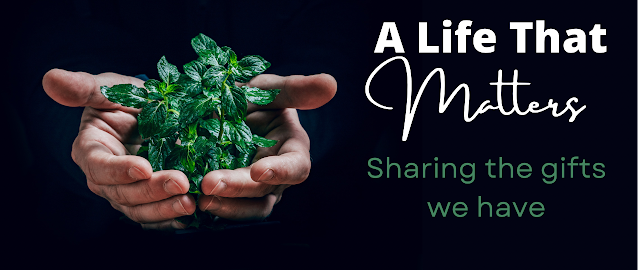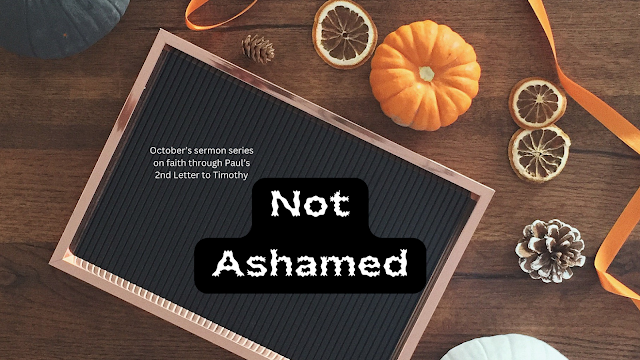Well Pleased - Luke 3: 15-17, 21-22 (Baptism of the Lord Year C)
Good morning again - last week, we talked through the first chapter of the Book of John, how the light of Christmas was lit and that lighthouses can help guide those in danger away from it.
This week, we’ve looped back around a couple of weeks because we are back talking about John the Baptist, continuing the story from… three weeks ago, I think? Hopefully, you’re not sick of John yet, although this is the last week we will be in the gospels for a while. Anyway - as you can see outside, the seasons are changing. Winter is here! Oh… no … not those seasons. Our season of Christmas has finished, and now we are in the season after Epiphany. We are back to those so-called “ordinary weeks” or numbered weeks because since we’ve celebrated Christmas and Epiphany, these are kind of the meat and bones weeks for Jesus’ actual ministry. Today we’ll be starting with his baptism, and over the next couple of months, we’ll be discovering being the body of Christ: how we can show that LOVE NEVER ENDS.
The scripture today is right in the middle of chapter 3 in Luke. As I alluded to earlier, the first two weeks of December were all about John and his coming to be, whether his birth which foreshadowed Jesus or now today, Jesus’ baptism giving John the completion of his name - the Baptist. Going back through the chapter, you’ll recall that John was this weird guy, living in the wilderness, but that the Holy Spirit even found him there, instead of someone else in maybe a palace or temple. Hopefully, you’ll also remember that when he was among a crowd that he insulted them, saying that their ancestry or who they know will not save them, but the Holy Spirit transforms through repentance.
Wow… that was a whole lot of back story, and this week you may want to go back and read the entire chapter just to get familiar with it. But right after the encounter with John and these people who came to be baptized, that’s where our scripture starts. People begin to talk about John and wonder if he’s the Messiah. He quickly shoots that down because he is not worthy enough to untie the Messiah’s sandals, which would have been a job for a slave. The people were craving a Messiah. They knew it meant the end of the oppression. It represented hope for the future; of course, they were trying to figure it out. But this process has been lasting for centuries, and I’m sure they were discouraged. John, though makes it very clear he is not the messiah but knows who is. He foretells the coming of the Messiah, who will baptize differently through spirit and fire. These could be symbols of wind and fire.. which represented the nearness of God through our natural world. These things can be found through the Old Testament, whether Moses and the Passover, the burning bush, among others. John continues, although it sounds like there is excellent judgment in the words of baptism by fire and how the Messiah will separate the wheat from its husks.
What is this baptism with… fire?? Separating the wheat from the chaff (or husks)? What does that even mean? Well - in this culture of farmers, they would have known what John was talking about. Once the wheat is harvested, it goes through several steps to ensure that the fruits - the good & useable parts - are kept, and the unusable parties are left behind. After a bit of research, I found out that harvesting grains are incredibly time-consuming when doing it by hand. Modern combines do both the processes altogether, but these ancient farmers would have known what John was talking about. To break it down, the winnowing fork would have been used to lift grains up and sort of toss it in the air so that the wind could take the lighter chaff and blow it to separate from the grains. Then the trash would be burned because it was unusable for any purpose.
Where the fire comes in seems to be the most disturbing part of the whole process. Historically, this idea of separating the wheat from the chaff has been used at the societal level for people who want to divide out who they feel are worthy and unworthy. Let me challenge that a bit. John is not talking about a societal level change. He is not baptizing communities. He is baptizing individuals, so inside each of us, we have our wheat and chaff. God wants the grain and can’t use the shell. So this is not a message of condemnation at all. The unusable needs to be purged to purify and find the gifts that bear fruit. That fruit - which we will be getting into in the coming weeks - the fruit of the spirit being things like forgiveness, generosity, humility.
That brings us back to the main bit of our text - the baptism of Jesus. Luke’s account is concise, and we don’t know what happened because he talks about it after the fact. I don’t know if that’s on purpose, because how do we know if we’re doing it the same way that Jesus did? Was he immersed? Was it sprinkled? Does that matter? Sometimes I think we get lost in some of those details to the detriment of the purpose. Jesus was baptized. But WHY? He is divinity personified. God is with us - Immanuel. Let’s notice something - was this a private ceremony, in a temple, with a priest? Was it done in secret? No - Jesus was among the people who were there. It was done in a public space, so Jesus is coming to his people.
Something else happens, and to be honest, I miss this level of detail. But, while Jesus was PRAYING, that’s when the sky opened. Jesus prays throughout his life, and specifically in the Gospel of Luke, prayer is the way of providing revelation in connecting with God. Again, Luke kind of glosses over the baptism ceremony and puts more words into the endorsement from heaven. And through that relationship is revealed - that Jesus is God’s Son, with whom he is well pleased. The skies opened for not just anyone but for someone, God had a relationship with. A deep relationship. I wouldn’t think God would go through such trouble to open the heavens and be like - here is Dan, my son. Meh - he’s ok. It just… doesn’t have the same ring to it.
Baptism in the Methodist church is one of only two sacraments that we offer. The other is … anyone? Anyone? Communion. Well - what is baptism in the Methodist church? It is a way to name someone and identify them as “beloved.” David Lose wrote Baptism reminds us that we discover who we are in relation to whose we are, God’s beloved children. We belong to God’s family, and baptism is a tangible sign of that.” We need to remember, though, that baptism is not something that we do. Every one of us who has been baptized has come to it, maybe as an infant where we had no control, or maybe as an adult, through the work of the Holy Spirit, leading to grace and the humbling gift that is a relationship with the creator. In being called by God to baptism, we are answering that call, and it has nothing to do with who WE are but who is doing the calling. We didn’t start the relationship, but we found the value and the honor in it and wanted to be faithful. Our baptism vows are also a public display here in the church. We talk about rejecting evil and repenting of sin, accepting freedom and power of God, and being faithful among the more remarkable universal church. But this sacrament is something that only happens once. In our denomination, because baptism is an act of God, it can only be performed once in your life. However, if you’d like to commemorate or celebrate profound faith experiences and want to reaffirm your commitment to faith, there are ways to renew those vows, much like marriage vows can be restored; our baptism is one thing that connects to the whole world of faith and the faithful, whether in our local church at Bethany or across the globe with all those who believe as a disciple of Jesus Christ. The baptism vows are also not only for the individual but also for the community. During the ceremonies, those in the congregation are asked to renew their commitment to the whole body of Christ, of which God can say that he is well pleased.
If anyone here today wishes to be baptized or knows of someone thinking about it, let me know, and we can help them get there. In this way, there is growth in not only the faith of the individual who receives the spirit but among the community as a whole. Again, the United Methodist church allows baptism at any age, so don’t worry that you missed a window. If you’re breathing, your window for baptism is not closed.
These words of God, I am well pleased, could be a different way of saying “I love you.” They were not offered because of anything Jesus had done or NOT done, but for being - just for being. “I love you” - words to hear in darkness, words to cling to in doubt. In the whirlwind of living and dying, we listen and then - by grace - speak these words; they are all we have. “I love you.” Let us not forget those words. I love you.
Amen.




Comments
Post a Comment